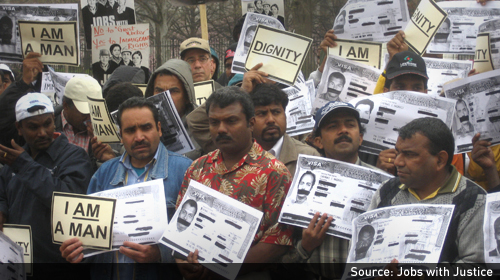
This was originally published by McClatchy.
The company wanted its workers to get the message that they would not have “free rein when they decide that they want to run.” This echo of the bondage of centuries past was in an email between managers at Signal International, the Alabama-based industrial ship manufacturing and repair giant.
They were writing about 500 guest workers from India, legally employed at Signal as welders and pipefitters with H-2B temporary work visas, but illegally subjected to fraudulent recruitment practices, squalid living conditions, and threats of serious harm.
Last week, in an effort to pursue long-delayed justice, three of America’s largest law firms filed lawsuits against Signal on behalf of many of these men, and at least five more major law firms have agreed to represent many more. In an unprecedented pro bono collaboration, the firms will collectively represent more than 200 former guest workers in these suits, which charge that the men were subjected to forced labor and fraud that rose to the level of racketeering and human trafficking.
The filings come as Congress considers comprehensive immigration reform, including an expansion of the foreign worker program that risks extending the very problems that took place at Signal. Legislators should take a close look at the story of Signal’s Indian guest workers, because any future foreign worker program must be designed to ensure that this type of human trafficking is put to an end.
It was March 2007. Over 500 men from India had arrived at Signal’s shipyards in Texas and Mississippi. They came on H-2B guest worker visas, but had been promised green cards – permanent residency – for themselves and their families. They paid dearly for these promises and a chance at the “American Dream” – going into debt to pay as much as $20,000 in recruitment fees, the equivalent of years of wages in India.
But when they arrived, the vision of a good life in the United States with their families was replaced by the squalor of an overcrowded, fenced-in, guarded labor camp. They were forced to live in unsanitary, racially segregated trailers where as many as 24 men shared only two toilets – and they were required to pay $1,050 per month each for these accommodations, even if they wanted to live somewhere else. The promises of green cards turned out to be lies. A group of outspoken workers was rounded up, locked in a guarded room, and told by Signal that they would be deported as an “example” to the other workers.
The following year, the workers, represented by our organizations and co-counsel, brought a class-action lawsuit against Signal. The court later ruled that our case could not be brought as a class action for procedural reasons, and now, the men who are no longer part of our lawsuit have decided to file individual cases against Signal.
The Signal story is not an isolated aberration – the structure of the U.S. guest worker programs invites abuse. Foreign recruitment networks often prey on the vulnerable. These recruiters need not register with the government, agree to follow U.S. law, or honestly disclose the terms of the job to their recruits. There is no U.S. government oversight of these recruiters and no accountability for the American companies that hire the workers they lie to.
Guest workers’ visas tie them to a single employer – no matter how bad things are. If the guest workers abandon their jobs (or “abscond,” as federal immigration authorities call it), they must choose to either return to their home country in crippling debt, or join the ranks of the nation’s undocumented workers. As merely “guests” in our nation, they are an underclass that is here purely as labor without humanity, to be removed under color of law when their job is done.
But there are ways to fix the current system. Employers should bear the costs of recruitment, visas and transport, so that guest workers do not arrive under mountains of debt. Once here, they should have the ability to leave abusive employers and seek other U.S. employment without worrying about getting arrested and deported.
To enforce these rules, there must be robust oversight of labor recruiters and accountability for employers who hire them. This means giving the foreign workers an unequivocal right to bring their recruiters and employers to court for abuses and broken promises, and access to lawyers to make this right meaningful.
Finally, guest workers and their families must also have a path to permanent residency and eventual citizenship. That’s fair and would guarantee basic human dignity for all involved.
After learning of the flaws in the existing program, Congressman Charles Rangel said, “This guestworker program’s the closest thing I’ve ever seen to slavery.”
He is correct, and to ensure that other workers don’t have to endure the same abuse that the Signal workers did, we must stop treating guest workers like disposable commodities.
Learn more about human trafficking and other civil liberty issues: Sign up for breaking news alerts, follow us on Twitter, and like us on Facebook.





